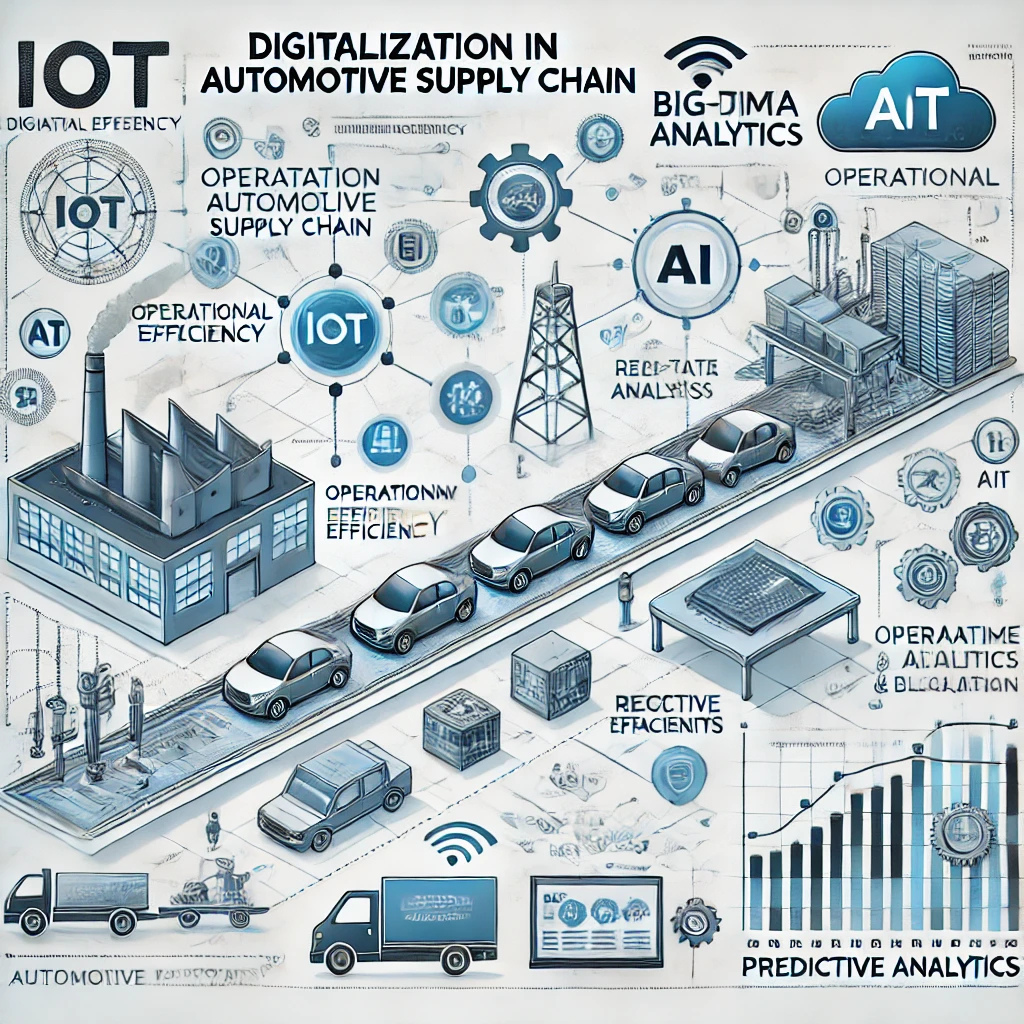The Role of Digitalization in the Automotive Supply Chain
The automotive industry has witnessed significant transformations in recent years, largely driven by advancements in digital technologies. Digitalization in the automotive supply chain refers to the integration of digital technologies, such as the Internet of Things (IoT), big data analytics, artificial intelligence (AI), and blockchain, into various supply chain processes. This review critically examines the role of digitalization in enhancing the efficiency and responsiveness of the automotive supply chain and highlights the challenges and opportunities that arise from these technological advancements.
One of the most significant impacts of digitalization in the automotive supply chain is the enhancement of operational efficiency through real-time data visibility and analytics. The integration of IoT devices allows manufacturers to monitor and track assets, inventory, and production processes in real time (Wang et al., 2016). For instance, companies like Ford and General Motors utilize IoT sensors to gather data on production lines and supply chain logistics, enabling them to identify bottlenecks and optimize processes (Kamble et al., 2020). By leveraging real-time data, automotive companies can make informed decisions, reduce lead times, and minimize waste, ultimately improving overall supply chain efficiency. Moreover, big data analytics plays a crucial role in enhancing demand forecasting and inventory management within the automotive supply chain. Advanced analytics can process vast amounts of data from various sources, including customer preferences, market trends, and historical sales data (Mishra et al., 2019).

This capability enables automotive manufacturers to predict demand more accurately and optimize inventory levels, reducing the risk of overproduction or stockouts. For example, Volkswagen employs predictive analytics to adjust its production schedules based on anticipated demand fluctuations, allowing for a more agile response to market changes (Volkswagen, 2021). In addition to operational efficiency, digitalization facilitates improved collaboration and communication among supply chain partners. Cloud-based platforms and collaborative tools enable real-time information sharing between manufacturers, suppliers, and logistics providers, fostering transparency and coordination. This interconnectedness allows for more effective supply chain management, as stakeholders can respond swiftly to disruptions or changes in demand. For instance, Daimler AG has implemented a digital supply chain platform that enhances collaboration across its global supplier network, leading to improved responsiveness and reduced lead times (Daimler, 2020).
Despite the numerous benefits of digitalization in the automotive supply chain, several challenges persist. One of the primary obstacles is the complexity of integrating new technologies with existing systems and processes. Many automotive companies operate on legacy systems that may not be compatible with modern digital solutions, leading to potential disruptions during the transition (Wang et al., 2016). Additionally, the investment required for digitalization initiatives can be substantial, posing financial challenges for smaller manufacturers. Data security and privacy are also significant concerns in the digitalized supply chain. The increased reliance on interconnected systems exposes automotive companies to cyber threats, which can compromise sensitive information and disrupt operations (Büyüközkan & Göçer, 2018). Ensuring robust cybersecurity measures and compliance with data protection regulations is essential for maintaining the integrity of digital supply chains.

Another challenge lies in the need for a skilled workforce capable of navigating and leveraging digital technologies. The automotive industry must invest in training and development programs to equip employees with the necessary skills to manage and analyze digital data effectively (Mishra et al., 2019). Failure to address this skills gap can hinder the successful implementation of digital initiatives.
Conclusion
In conclusion, digitalization plays a transformative role in the automotive supply chain, enhancing operational efficiency, demand forecasting, and collaboration among stakeholders. While the benefits are substantial, the automotive industry must navigate challenges related to integration, data security, and workforce skills to fully realize the potential of digital technologies. As the industry continues to evolve, the ongoing commitment to embracing digitalization will be critical in maintaining competitive advantage and meeting the demands of an increasingly dynamic market.
References
- Büyüközkan, G., & Göçer, F. (2018). Digital supply chain: A systematic literature review. Procedia Computer Science, 140, 63-70. https://doi.org/10.1016/j.procs.2018.10.260
- Daimler. (2020). Daimler AG: Digitalization in the Supply Chain. Retrieved from Daimler Group Website
- Kamble, S. S., Gunasekaran, A., & Sharma, R. (2020). Industry 4.0 and digital supply chain management: A review of literature and implications for future research. International Journal of Production Research, 58(10), 2905-2930. https://doi.org/10.1080/00207543.2020.1789820
- Mishra, D., Dey, B., & Haldar, A. (2019). Digital transformation in supply chain management: A review and research agenda. International Journal of Operations & Production Management, 39(6), 1-25. https://doi.org/10.1108/IJOPM-01-2018-0058
- Volkswagen. (2021). Sustainability Report 2021. Retrieved from Volkswagen Group Website
- Wang, Y., Gunasekaran, A., Ngai, E. W., & Papadopoulos, T. (2016). Big data in logistics and supply chain management: Facts and fiction. International Journal of Production Economics, 176, 98-110. https://doi.org/10.1016/j.ijpe.2016.03.014